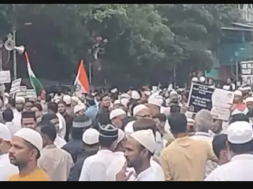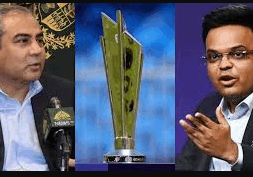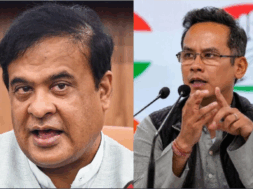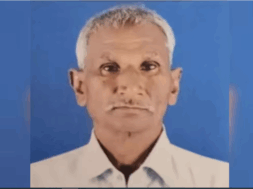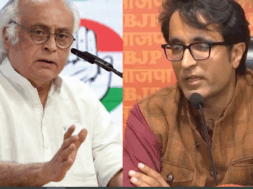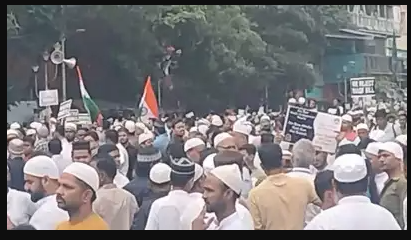
Petitions Filed in SC Challenging Waqf Amendment Bill, Protests in Various Cities
Manas Dasgupta
NEW DELHI, Apr 4: With the Rajya Sabha adopting the Waqf Amendment Bill by 128 votes to 95 after 12 hours debate that completed well past Thursday midnight, Two Opposition MPs on Friday filed petitions in the Supreme Court challenging the bill on grounds of it being “discriminatory towards Muslim.”
Massive demonstrations were held by the Muslims on the streets of Kolkata, Chennai, Ahmedabad and various other cities in protest against the passing of the Waqf amendment bill by Parliament while strict security arrangements were made in Delhi, Uttar Pradesh and many other states in north India to maintain law and order in view of the expected Muslim congregations to offer Friday Namaz.
Congress MP Mohammad Jawed and AIMIM MP Asaduddin Owaisi filed separate petitions against the passing of the contentious bill, calling the provisions “blatant violation of the fundamental rights of Muslims.” The Lok Sabha having already passed the bill on Wednesday, it will now be awaiting the President Droupadi Murmu’s assent before it can become an act.
In addition, the Congress is also preparing to challenge the measure in the apex court. In a post on X, AICC general secretary Jairam Ramesh said on Friday that it would “very soon” challenge in the Supreme Court the constitutionality of the Waqf (Amendment) Bill. “The INC will very soon be challenging in the Supreme Court the constitutionality of the Waqf (Amendment) Bill, 2024.” “We are confident and will continue to resist all assaults of the Modi Govt on the principles, provisions, and practices that are contained in the Constitution of India,” he said.
Congress leader BK Hariprasad said, “The bill has been passed in the Lok Sabha and Rajya Sabha, just because they have numbers. It is totally unconstitutional. The Congress will carry out a legal battle against the bill…”
Mr Jawed in his petition said the bill violated the fundamental rights of Muslims. He contended it violates Article 14 (right to equality), 25 (freedom to practice religion), 26 (freedom to manage religious affairs), 29 (minority rights), and 300A (right to property) of the Constitution. Mr Jawed is the Congress’s whip in the Lok Sabha. He was also a member of the joint parliamentary committee on the Waqf (Amendment) Bill.
The proposed law discriminates against Muslims by imposing restrictions that are not present in the governance of other religious endowments, the Congress MP said in the petition filed through his lawyer Anas Tanwir. “For instance, while Hindu and Sikh religious trusts continue to enjoy a degree of self-regulation, the amendments to the Waqf Act, 1995 disproportionately increases state intervention in Waqf affairs,” the petition said.
“Such differential treatment amounts to a violation of Article 14 in addition to introduction of arbitrary classifications that lack a reasonable nexus to the objectives sought to be achieved, making it impermissible under the doctrine of manifest arbitrariness,” it said.
Mr Jawed said the proposed law introduces restrictions on the creation of Waqfs based on the duration of a person’s religious practice. “Such a limitation is unfounded in Islamic law, custom or precedent and infringes upon the fundamental right to profess and practice religion under Article 25. Additionally, the restriction discriminates against individuals who have recently converted to Islam and wish to dedicate property for religious or charitable purposes, thereby violating Article 15,” the petition said.
The petition said the amendment to the composition of the Waqf Board and the Central Waqf Council that made it a must to include non-Muslim members in Waqf administrative bodies was an unwarranted interference in religious governance, unlike Hindu religious endowments that remain exclusively managed by Hindus under various state enactments.
Mr Owaisi has challenged the amendments in the Bill on the grounds of violation of the fundamental rights of the Muslim community.
Meanwhile, Thousands gathered on the streets of Kolkata, Chennai, and Ahmedabad Friday – after weekly prayers by the Muslim community – to protest the bill. Visuals from the Bengal capital showed a large crowd waving the national flag and carrying posters proclaiming ‘we reject Waqf amendment’ and ‘Reject Waqf Bill’ gathering at public meeting sites. Many of the protests were organised by the non-political Joint Forum for Waqf Protection
Visuals of the protests from Ahmedabad suggested a more charged atmosphere; a video showed police trying to forcibly remove elderly demonstrators squatting on the road. Similar scenes were witnessed in Chennai, where actor Vijay’s Tamilaga Vettri Kazhagam had announced a statewide protest. TVK workers gathered in Chennai and major cities, like Coimbatore and Tiruchirappalli, and raised slogans like ‘reject the Waqf Bill’ and ‘do not take away Muslims’ rights.’
The Tamil actor-politician – seen increasingly as a dark horse before next year’s Assembly election – called the Waqf Bill “anti-democratic” and said its passage asks questions of India’s secular foundation.
The protests in Bengal will add to the fire brewing ahead of next year’s election, with Chief Minister Mamata Banerjee having already said she would not allow the state’s Muslims to lose their lands. Accusing the BJP of trying to divide the country, an accusation also levelled by the Congress – she declared the bill would be repealed when the new non-BJP government forms the central government.
One concern of all these protesters is that the new Waqf laws will be applied retroactively, thereby affecting existing properties. However, Union Minority Affairs Minister Kiren Rijiju told Parliament this week (and he was backed by Union Home Minister Amit Shah) it is prospective in nature.
